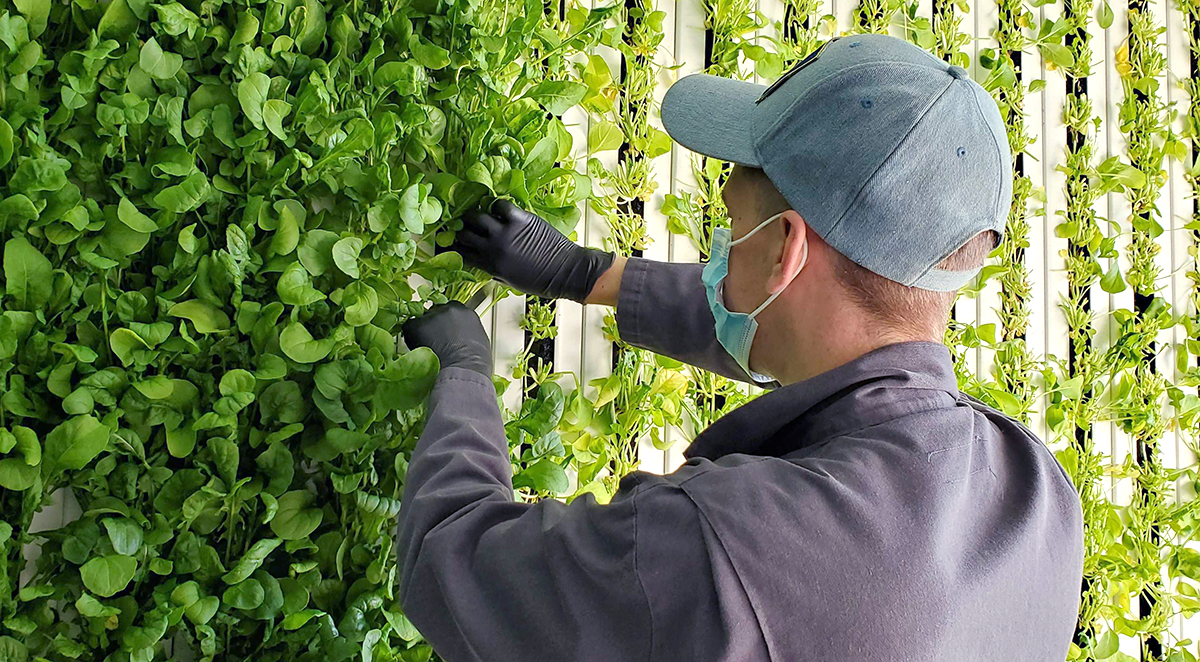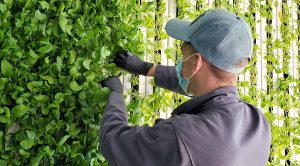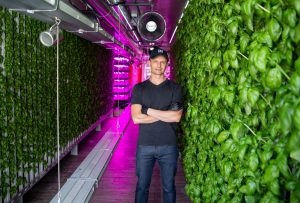Blog
We First 5: What You Need to Know this Friday


How can we reduce the climate impacts of our food system? How can we get the freshest produce to people in urban areas? How can we offer fulfilling jobs to today’s youth? These are all issues that Square Roots is working to address.
“The mission of the company is to bring locally grown food to people in cities, all across the world while empowering the next generation of leaders in urban agriculture,” Tobias Peggs, Co-Founder and CEO of Square Roots, tells We First.
The agriculture startup’s modular and technology-first design is transforming how food is grown and distributed in amazing ways. The scalability and data driven approach make Square Roots an excellent example of a company demonstrating how to scale business growth and impact.
Founding story
Before Square Roots, Tobias received a PhD in machine learning and had worked for a number of successful startups, one of which was acquired by Walmart. “I worked as a data scientist there for a year. One of the projects they had me do was study global grocery buying behaviors.” With around 300 million customers, Tobias had a massive amount of data to pull insights from.
“That’s a lot of bananas flying all over the world,” he says. “You begin to think about the impact of transportation on the planet. “As food is traveling, nutrients are breaking down and maybe the quality of food isn’t as good at the end of long supply chains as it would be for local food. Customers don’t have any idea of where that food comes from. The sense of community around food was just lost.”
The insights Peggs was having lit a spark in his entrepreneurial engine. “People want food from all over the world. That’s not going to change,” he says. “Instead of shipping food, how about we ship environmental data from one part of the world to the other?” By collecting data on the best growing conditions, Tobias could hypothetically grow anything at any time of year in a controlled indoor environment made from repurposed shipping containers and deliver that to a nearby retail store on the day it’s picked. “It looks and smells amazing, which also means all the nutrients are intact,” he says. “That was the idea behind Square Roots.”
Peggs co-founded the company with Kimbal Musk, “He would say, ‘Can it feed the world? And are we going to make a massive positive impact? If so, let’s figure out how to get this done,’” Peggs recalls. The two innovators began by working together in a WeWork office. “With the experience of being involved in a number of startup companies before – some successful, some failure – I know for sure that if you don’t get started, you’re going to fail.”
In the two-man brainstorming sessions, Peggs and Musk would visualize the business at scale. “We saw these modular farms in every city across the world. That is the way that we’re able to think about feeding every consumer on the planet with locally-grown food,” Peggs says.”There was a missing piece of the puzzle. There wouldn’t be enough farmers to hire to staff all of those farms.” That realization was the foundation of the second pillar of Square Roots’ purpose, “To provide pathways for young people to come into the farming industry and become the future leaders,” he shares.
Leading with purpose

Square Roots’ core business was structured to address some of the world’s biggest challenges. Food is interconnected with climate, which also poses risks on outdoor crops. It is also fundamental to public health and prosperity. As the global population rises, our planet’s carrying capacity will be tested. We need to innovate to meet that rising global demand for food.
The model relies on able bodied young people to tend to the crops. The talent pool of skilled farmers in the U.S. is aging. The average farmer is 58 years old. “Who the hell is going to grow all the food when our current farmers retire in five or 10 years time? ” Tobias proposes. “We had to figure out a way to bring young people into the industry and train them quickly so they could be not just productive farmers, but feel infused about a career in a completely new industry.”
To overcome the hurdle, the founders developed hardware, software and teaching methods. “We had an investment banker who was bored sitting behind a spreadsheet all day. He quit his job to join Square Roots because he wanted to make an impact on the world. He was growing the most delicious kale, you’ve ever tasted in your life,” Peggs says. “That was six months after making the transition, it was magic to see that.” Within a year they trained 10 people, many with no previous farming experience.
In addition to creating purpose-driven employment opportunities, Square Roots is addressing climate through transportation and waste. “Forty percent of food from industrial systems is wasted. We waste around 3%,” Tobias says. A significant portion of wasted food is discarded before it even hits the shelf, due to damages during shipping or spoiling quickly. “Because we’re indoor, there’s a lot of precision, a lot of control. We can grow food for demand.”
Modular design
Square Roots’ structure allows it to be replicated and optimized from a systems approach. It’s a distributed model. “We deploy clusters of these modular farms together so there’s some operational scale and the business economics work,” Peggs explains. “Each farm serves its local market and runs its own independent business entity, set on top of a standard technology platform.” Every compound grows, harvests, packages and delivers produce to local retailers. “We look after everything from seed to shelf.”
The growing startup has set up operations in Brooklyn, New York and Grand Rapids, Michigan with plans for expansion across the Midwest, the North East in cities around the world where demand is large enough. People can see inside the shipping containers and when COVID-19 is under control, you can schedule a farm tour. “While its a very scalable platform, the consumer experience is a hyper-local one.”
Leveraging data & technology
When it comes to deciding what to grow, Square Roots focuses on crops that require the least amount of energy. “Walk into a supermarket. Lineup every single fruit and vegetable from the lightest to the heaviest. And that’s essentially our product roadmap for the next 20 years,” Peggs says.
They also choose crops based on economic yields based on competitive market prices. “This is where data science and technology marry,” Tobias says. “Outdoor farmers can’t suddenly look at the sun, make it twice as efficient and reduce costs or double their yield. Indoor farmers can.”
Integration of AI machine learning empowers Square Roots to optimize at scale. “We’re building a network of cloud connected modular farms,” Tobaias says. The company monitors and collects data from each of those farms every second. “We’re looking at temperature, humidity, nutrients, yield, taste and texture,” Peggs says. “ If in one particular box, a farmer did something or we changed an environmental parameter that increased yield or improves efficiency, we can spot that information from the data and push that new instruction out across the whole network. The whole network is learning how to farm better as we go about building the business.”
Building community
Food has the potential to unite people. While Square Roots farms are indoors, they connect and share knowledge with outdoor farmers. “ I’ll give you an example,” Tobias says. “A good technique in organic farming is known as integrated pest management, where a farmer might release beneficial insects onto the crop, essentially ridding the nasty insects that we don’t want. We use that technique inside the farm.”
“The farmers that we work with are very much on the same mission, which is how do we get people more connected with where their food comes from? How do we build that sense of community around food? And I think the common enemy is the industrial food system,” Peggs says. That common enemy also resonates with employees, consumers and other key stakeholders who join together around a set of core values.
“I know pretty much every founder or CEO of every indoor farming company. There’s remarkable alignment around that mission,” Tobias says. “Everybody understands that we’ve got to change the food system and if we’re helping each other out, it’s better for all of us.” Tobias mentions companies like Gotham Greens and Oishii that are also innovating in the indoor farming space.
Purpose also informs Square Roots’ investor strategy. “We’re a venture backed company. When we’re talking with investors, we want to make sure that they’re mission aligned. I can’t tell you how many investors have talked to me about considering cannabis. It’s not aligned with our mission.” A lot of people don’t realize that the power of purpose is just as compelling in terms of what you don’t do, as opposed to what you do.
The takeaway here is that building your community around shared purpose fosters goodwill amongst team members and customers. It also presents collaborative opportunities with other brands and organizations working towards the same goal.
Challenges and opportunities

With the opaque information in the industrial food system and increased health consciousness, consumers are looking for transparency. In addition to its open invitation to check out the farms, the company includes a QR code on each product. You can scan the code and learn all about where it’s made and the value chain.
COVID-19 has also presented challenges for businesses across sectors and Square Roots is no exception. Before the pandemic, they trained new hires to be farmers in classrooms. “If we didn’t have our mission, it would have been easy to say, ‘We got to keep growing, forget this farmer training stuff. We’re just going to go hire experienced people.’ Or we could have developed a robot to do part of the job of a farmer,” Tobias says.
“The mission allowed us to focus on solving issues with our current business model,” he continues. “It was already misaligned. Everyone was able to get behind it very quickly. And we were actually able to solve problems and put in place new programs and new policies ridiculously quickly. Never waste a good crisis.”
Despite adversity, the startup has started true to its mission and transitioned to digital and socially distanced training and built a more robust system than before.
The future of food
Technology and data are a critical aspect of emerging agriculture trends. “Food is a $12 trillion industry,” Peggs states. “There’s about 20 companies that have raised a bunch of money and are doing this stuff in America.”
“Indoor farming actually reminds me of the internet in the early ’90s,” he says. “We know this thing is inevitable, but no one can quite yet tell you what shape it’s going to take in the future. Indoor farming is like that. We’re all helping each other figure out how this eventually feeds every consumer in the world.”
While innovation is budding, “The food system has to become a lot more responsible and sustainable,” Peggs says. “The current food system cannot feed the new future world, which has 10 billion people, 70% living in urban areas that are not near these industrial farms.”
We’ve seen changes over the last two decades with the organic food movement, which now grosses $25 to $30 billion annually, Tobias says. He thinks that COVID-19 will accelerate the shift towards healthy and sustainable food. “People were forced to stay at home and cook. You get more curious about the food that you’re buying, and you observe how long it lasts in your refrigerator. You get more educated,” Tobias says. “We are in the first inning of indoor farming. We’re just getting started.”
Lessons for entrepreneurs
With his experience from Square Roots and beyond, Tobias Peggs’ insights offer valuable lessons for entrepreneurs looking to Lead With We. Here are three teachings from Peggs on how to build a successful startup.

